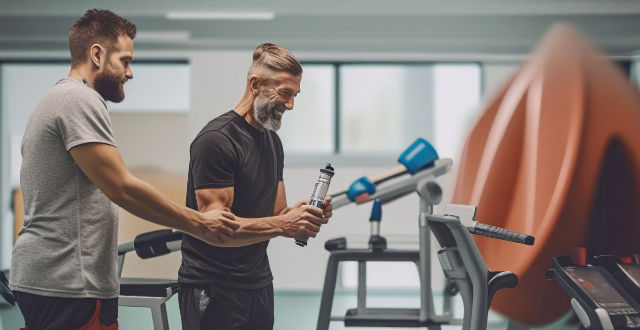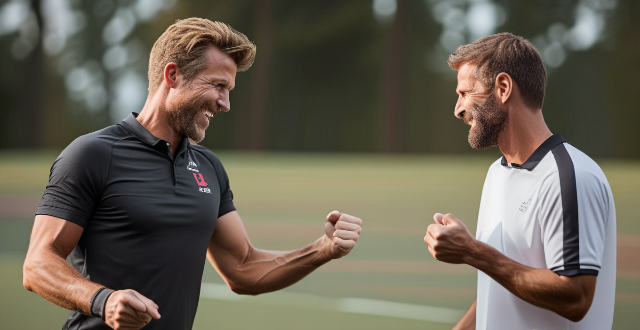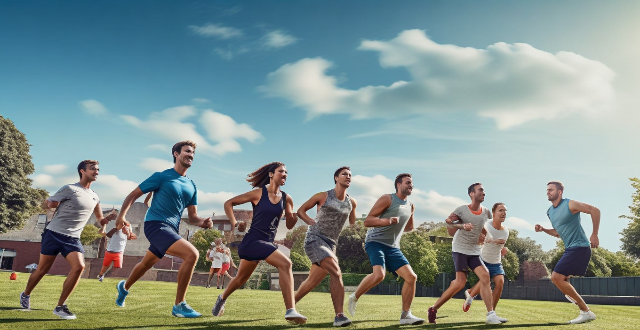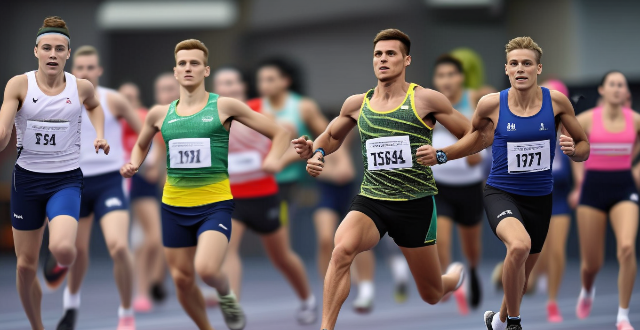Confidence Belief

How do psychological factors, such as confidence and self-belief, affect an athlete's ability to perform at their best ?
This topic summary discusses the importance of psychological factors in athletic performance, focusing on confidence and self-belief. Confidence is defined as belief in one's abilities, skills, and judgment, while self-belief is more about internalizing one's capabilities and potential for success. Both are crucial for mental preparation, risk-taking, resilience, motivation, teamwork, goal setting, persistence, visualization, feedback interpretation, and stress management. Strategies for building confidence and self-belief include positive self-talk, mental rehearsal, goal setting, reflection, and having a strong support system. The text emphasizes that these psychological elements are integral to athletic success, enabling athletes to overcome obstacles and reach their full potential.

How does sports participation affect one's self-esteem and confidence ?
Sports participation positively affects self-esteem and confidence by providing opportunities for skill development, goal achievement, positive feedback, facing challenges, overcoming obstacles, and developing a sense of mastery.

Can playing sports improve one's self-confidence and personal growth ?
Playing sports can contribute to self-confidence and personal growth by developing skills, overcoming challenges, fostering teamwork and support, promoting discipline and responsibility, encouraging goal setting and achievement, and enhancing social interaction and empathy. Incorporating sports into one's lifestyle can be highly beneficial for overall well-being and personal development.

What role does confidence play in developing a winning sports mindset ?
The article discusses the importance of confidence in developing a winning sports mindset, highlighting its role in allowing athletes to believe in their abilities, stay focused on their goals, overcome obstacles, and maintain a positive attitude. It also provides tips for building self-confidence through setting realistic goals, visualization, positive self-talk, seeking feedback, and thorough preparation.

In what ways do sports enhance self-esteem and confidence ?
Participating in sports can significantly boost an individual's self-esteem and confidence. Here are some ways how: 1. Achieving Goals 2. Overcoming Challenges 3. Social Interaction 4. Physical Health 5. Learning New Skills 6. Receiving Feedback 7. Leadership Opportunities 8. Competition Experience 9. Wearing Uniforms 10. Public Performance

What impact does consumer confidence have on economic recovery ?
Consumer confidence is a key driver of economic recovery. It stimulates growth, boosts employment rates, reduces unemployment, and increases government revenue. To improve consumer confidence, governments should encourage stable economic policies, provide financial education, promote transparency, and invest in infrastructure.

What are the psychological effects of winning or losing in competitive sports ?
Winning or losing in competitive sports can have significant psychological effects on athletes, ranging from increased confidence and motivation to feelings of disappointment and frustration. Winning can boost an athlete's self-confidence, motivate them to continue striving for excellence, and improve their mental health. Losing can lead to feelings of disappointment, decreased confidence, and increased stress and anxiety. To manage these effects, athletes should develop effective coping strategies such as mindfulness, positive self-talk, goal setting, seeking support, and relaxation techniques. By doing so, they can maintain a healthy mindset both on and off the field.

What role do sports play in improving self-esteem and confidence ?
Sports have been recognized as a powerful tool for enhancing self-esteem and confidence. This is because they provide opportunities for individuals to challenge themselves, achieve goals, and develop a sense of accomplishment. In this article, we will explore the various ways in which sports can contribute to these positive outcomes. Firstly, engaging in sports can lead to improved physical health, which in turn can boost self-esteem and confidence. Secondly, sports can also have a positive impact on mental health by releasing endorphins that reduce symptoms of depression and anxiety. Thirdly, participating in group activities can help individuals develop communication skills and build relationships with others who share similar interests. Fourthly, achieving goals in sports can lead to a sense of accomplishment and pride that translates into other areas of life. Finally, overcoming challenges in sports can teach individuals valuable lessons about resilience and determination. Overall, sports play a significant role in improving self-esteem and confidence by providing opportunities for physical health benefits, mental health improvements, social interaction, goal setting and achievement, and overcoming challenges.

How can women build their self-confidence in the workplace ?
The text provides a summary of how women can build self-confidence in the workplace through embracing achievements, setting realistic goals, developing new skills, practicing self-care, surrounding themselves with positive influences, speaking up and owning ideas, seeking mentorship, challenging themselves, celebrating uniqueness, and learning from failure.

What methods do sports psychologists use to boost confidence and self-esteem in athletes ?
Sports psychologists employ various methods to boost athletes' confidence and self-esteem, including goal setting, visualization, feedback, cognitive restructuring, stress management, and social support strategies. These techniques help athletes set clear objectives, mentally prepare for competition, receive constructive feedback, challenge negative thoughts, manage stress, and feel supported by their team, ultimately enabling them to perform at their best.

In what ways do sports promote mental and emotional growth in individuals ?
The article discusses the role of sports in promoting mental and emotional growth. It mentions that participating in sports can improve self-esteem, confidence, social skills, resilience, perseverance, time management, organizational skills, and stress reduction techniques. The benefits of sports extend beyond the athletic field and contribute to overall personal development and success in various aspects of life.

What's wrong with the belief that cardio is the best way to lose weight ?
This critical analysis challenges the prevailing belief that cardio exercises are the most effective way to lose weight. It argues that this belief is misguided due to an overemphasis on calorie burning, neglect of other forms of exercise, potential for overuse injuries, and limited sustainability and enjoyment. The analysis suggests a well-rounded fitness routine that includes strength training, flexibility exercises, and other forms of physical activity to support overall health, prevent injuries, and ensure long-term success in maintaining a healthy weight.

What are some common misconceptions about personal finance that financial education aims to correct ?
The text discusses common misconceptions about personal finance, such as the belief that saving is more important than investing and that credit cards are inherently bad. It also touches on the perceived tedium of budgeting, the underestimation of life insurance's importance, and the notion that retirement savings are unattainable for some. Moreover, it dispels the myth that all investments carry high risk and emphasizes the necessity of having a will. Overall, the article highlights how financial education can correct these misguided beliefs and help individuals manage their money wisely to achieve their financial objectives.

How does sports psychology contribute to injury recovery and rehabilitation ?
Sports psychology can contribute to injury recovery and rehabilitation by helping athletes cope with psychological challenges, develop confidence and self-belief, establish good habits and routines, and adjust to life after injury. Incorporating sports psychology into an athlete's rehabilitation program can lead to better results and quicker recovery.

How does mental toughness impact athletic performance at a competitive level ?
In summary, this article explores the impact of mental toughness on athletic performance at a competitive level. It highlights the benefits of mental toughness, including enhanced focus and concentration, improved resilience and coping mechanisms, increased confidence and self-belief, and better decision making under pressure. The article also provides practical tips for developing these essential skills through mindfulness techniques, visualization, positive self-talk, scenario training, and continuous self-improvement. Overall, mental toughness is crucial for athletes to perform at their best and achieve success in their chosen sport.

How do sports competitions influence stress levels and mental readiness ?
Sports competitions can significantly impact stress levels and mental readiness. Performance pressure, fear of failure, winning obsession, and physical exertion can increase stress levels, while confidence building, goal achievement, camaraderie, and mindfulness practices can decrease them. Similarly, focus and concentration, resilience, mental toughness, and visualization techniques can improve mental readiness, while overthinking, perfectionism, lack of self-belief, and external factors can impair it. Overall, sports competitions provide opportunities for growth, learning, and personal development but also present challenges that require effective coping strategies to manage stress levels and maintain mental readiness.

How can sport psychology counseling help athletes improve their performance ?
Sport psychology counseling is a specialized field that focuses on the mental and emotional aspects of athletic performance. It aims to enhance an athlete's mindset, motivation, and overall well-being to improve their sporting outcomes. Here's how it can be beneficial: Goal Setting and Motivation: Sport psychologists help athletes set Specific, Measurable, Achievable, Relevant, and Time-bound goals. This clarity in objectives boosts motivation and directs efforts toward improvement. Confidence and Self-Esteem Building: Coaching athletes to replace negative self-talk with positive affirmations enhances their confidence and self-belief. Anxiety and Stress Management: Techniques like deep breathing, progressive muscle relaxation, and mindfulness can reduce anxiety levels before and during competitions. Focus and Concentration: Improving an athlete's ability to focus on relevant cues and block out distractions is crucial for peak performance. Team Dynamics and Interpersonal Skills: Enhancing communication within teams fosters better cooperation and understanding among athletes. Mental Toughness and Resilience: By preparing mentally for setbacks, athletes learn resilience and are better equipped to handle difficulties when they arise. Recovery and Balance: Adequate rest is essential for physical recovery and maintaining mental sharpness. Sport psychologists can guide effective strategies. Helping athletes achieve a balance between their sport and personal lives prevents burnout and keeps them motivated.

How does sports psychology differentiate between elite and average performers ?
In sports psychology, elite athletes are distinguished from their average counterparts by a combination of psychological traits, physiological factors, and environmental influences. Key differences include mental toughness, self-confidence, focus, emotional regulation, motivation, and the quality of support systems. Elite performers typically exhibit superior resilience, set ambitious goals, maintain better concentration, manage emotions effectively, possess intrinsic motivation, and train in environments that foster excellence. In contrast, average performers may struggle with these aspects, leading to suboptimal performance. Understanding these distinctions can help coaches, athletes, and sports psychologists develop strategies for improvement and success.

What is the Consumer Confidence Index and how does it impact the economy ?
The Consumer Confidence Index (CCI) is a measure of consumer sentiment about the economy. It impacts the economy by serving as an indicator of economic health, influencing spending habits, affecting policy decisions, guiding business strategies, and causing market reactions. Overall, the CCI helps stakeholders make informed decisions based on consumer confidence levels.

Is there a connection between physical fitness and self-esteem ?
The article discusses the relationship between physical fitness and self-esteem, stating that engaging in regular exercise and maintaining a fit body can improve one's body image, confidence, mental health, and social interaction. In contrast, poor physical fitness can lower self-esteem by negatively impacting body image, confidence, stress levels, and leading to isolation. The author concludes that maintaining good physical fitness is essential for overall well-being and self-esteem.

What are the key factors that contribute to high-level sports performance ?
High-level sports performance is determined by a combination of physical prowess, mental strength, tactical acumen, and favorable environmental conditions. Physical factors include strength and conditioning, flexibility and mobility, nutrition and hydration, and rest and recovery. Psychological factors encompass mindset and motivation, confidence and self-belief, mental toughness, and concentration and focus. Tactical factors involve technical skill, game intelligence, adaptability, and teamwork and communication. Environmental factors include training facilities, coaching staff, and support personnel. By addressing each of these factors through dedicated training and support systems, athletes can reach their full potential and achieve excellence in their chosen sport.

What role does sports play in shaping an individual's personality and character ?
Sports play a crucial role in shaping an individual's personality and character. They foster the development of social skills such as teamwork, leadership, and resilience. Participating in sports also builds self-confidence through achievement and overcoming fears. Additionally, sports promote discipline and time management by requiring consistent practice and training schedules. Goal setting is another important aspect of sports that teaches individuals about planning and focus. Finally, sports encourage healthy lifestyle habits by promoting physical fitness and raising awareness about proper nutrition. Overall, sports provide valuable experiences that contribute to personal growth and success in various aspects of life.

Can team sports help in coping with pressure ?
Team sports can help cope with pressure by developing resilience, building confidence, providing supportive networks, and teaching time management.

How can psychology improve an athlete's performance ?
The article discusses how psychology can improve an athlete's performance by addressing various psychological factors that can influence their mindset and behavior. The author provides a topic summary of the main points covered in the text, which includes goal setting, self-talk, stress management, confidence building, and team dynamics. Each section explains the objectives and benefits of each technique and how they can be applied to enhance an athlete's mental toughness, resilience, and winning mindset. The conclusion emphasizes the importance of incorporating psychology into an athlete's training regimen for overall well-being and enjoyment of sports.

What techniques can help me stay calm during a test ?
Techniques to Stay Calm During a Test Staying calm during a test can greatly improve your performance. Here are some techniques that can help you stay focused and relaxed: 1. Deep Breathing: Take slow, deep breaths to slow down your heart rate and lower your blood pressure, reducing feelings of anxiety and stress. 2. Visualization: Picture yourself successfully completing the test and achieving your desired outcome, boosting your confidence and relaxation. 3. Positive Self-Talk: Replace negative thoughts with positive affirmations that boost your confidence and motivation. 4. Break Down the Test into Smaller Parts: Focus on one question at a time without worrying about the others. 5. Time Management: Allocate enough time for each section of the test and stick to your plan, working steadily but efficiently.

What are the benefits of seeking sport psychology counseling for athletes ?
Sport psychology counseling provides athletes with numerous benefits, including improved performance, stress management, mental toughness, enhanced team dynamics, and personal growth. Athletes can develop better focus, confidence, and goal-setting abilities, learn to manage anxiety and pressure, cope with adversity, and improve communication and leadership skills within their teams. Additionally, sport psychology counseling promotes self-awareness, life skills, and balance in an athlete's life. Seeking the help of a sport psychology professional can significantly contribute to an athlete's overall well-being and success in their sport.

What is sports psychology and how does it impact athletic performance ?
Sports psychology is a specialized branch of psychology that focuses on how psychological factors influence athletic performance. It encompasses the study of athletes' motivation, mental preparation, concentration, confidence, team dynamics, and the psychological aspects of injury and recovery. By understanding these elements, sports psychologists help athletes enhance their performance, cope with stress, and achieve peak mental states for competition. The key areas of sports psychology include motivation, mental preparation, concentration, confidence, team dynamics, and injury and recovery. Motivation involves intrinsic and extrinsic motivation, as well as goal setting to improve focus and commitment. Mental preparation includes visualization and imagery, self-talk, and flow state. Concentration involves focus management and ignoring distractions. Confidence includes self-efficacy and mental toughness. Team dynamics involve group cohesion and role acceptance. Injury and recovery involve coping strategies for dealing with the emotional impact of injuries and maintaining motivation and positive mindset during rehabilitation. The impact of sports psychology on athletic performance is multifaceted, including enhanced performance through improved focus and increased resilience, mental health benefits such as stress reduction and boosted self-esteem, and team synergy through better communication and coping with pressure. Overall, integrating sports psychology into training regimes can help athletes cultivate the mental fortitude needed to reach their full potential and enjoy a healthier sporting lifestyle.

What role does mental training play in improving sports skills ?
The text discusses the role of mental training in enhancing sports skills. It outlines key points including mental toughness, visualization techniques, goal setting, self-talk, and concentration skills. Mental toughness helps athletes handle pressure, recover from setbacks, and persist through challenges. Visualization techniques can program the subconscious, reduce anxiety, and increase motivation. Goal setting clarifies objectives, tracks progress, and maintains motivation. Positive self-talk boosts confidence, enhances performance, and regulates emotions. Concentration skills block distractions, maintain attention, and improve decision making. The conclusion states that mental training is an essential component of overall athletic success.

Can sports provide a platform for individuals to challenge themselves and reach their full potential ?
**Summary:** This essay posits that sports provide a comprehensive platform for individuals to challenge themselves and reach their full potential. It explores how sports offer psychological benefits such as mental toughness, goal setting, and confidence building; physiological benefits including improved physical fitness, skill development, and resilience; and social benefits like teamwork, leadership, and camaraderie. Personal stories of overcoming adversity further underscore the transformative power of sports in personal growth. The conclusion affirms that sports are not just about physical activity but are a means to unlock human potential holistically.